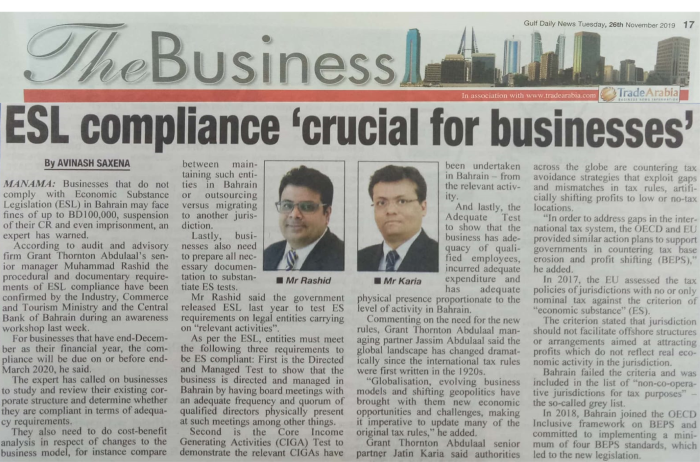- Consumer Products
- Energy & Natural Resources
- Education Sector
- Insurance Services
- Financial Services
- Healthcare Sector
- Manufacturing
- Not For Profit
- Public Sector
- Real Estate & Construction Sector
- Technology, Media & Telecommunications
- Travel, Tourism & Leisure
- Food and Restaurant
- Professional Services
-
Business Risk Service
Organisations must understand and manage risk and seek an appropriate balance between risk and opportunities.
-
Transaction Advisory, M& A, Business Consultancy
Transaction Advisory, M& A, Business Consultancy
-
IT Advisory
IT Advisory
-
Business Process Solutions
Business Process Solutions
-
Managing the VAT Audit
Managing the VAT Audit
-
Transfer Pricing
Global transfer pricing is all about understanding your business and the value drivers of your industry in an ever-changing environment.
ESL compliance ‘crucial’ for businesses’
MANAMA. Businesses that do not comply with Economic Substance Legislation (ESL) in Bahrain may face fines of up to BD100,000, suspension of their CR and even imprisonment, an expert has warned.
According to audit and advisory firm Grant Thornton Abdulaal’s senior manager Muhammad Rashid the procedural and documentary requirements of ESL compliance have been confirmed by the Industry, Commerce and Tourism Ministry and the Central Bank of Bahrain during awareness workshop last week.
For businesses that have end-December as their financial year, the compliance will be due on or before their end-March 2020, he said.
The expert has called on businesses to study and review their existing corporate structure and determine whether they are compliant in terms of adequacy requirements.
They also need to do cost-benefit analysis in respect of changes to the business model, for instance compare between maintaining such entities in Bahrain or outsourcing versus migrating to another jurisdiction.
Lastly, businesses also need to prepare all necessary documentation to substiate ES tests.
Mr. Rashid said the government released ESL last year to test ES requirements on legal entities carrying on “relevant activities”.
As per the ESL, entities must meet the following three requirements to be ES compliant: First is the Directed and Managed Test to show that the business is directed and managed in Bahrain by having board meetings with an adequate frequency and quorum of qualified directors physically present at such meetings among other things.
Second is the Core Income Generating Activities (CIGA) Test to demonstrate the relevant CIGAs have been undertaken in Bahrain – from the relevant activity.
And lastly, the Adequate Test to show that the business has adequacy of qualified employees, incurred adequate expenditure and has adequate physical presence proportionate to the level of activity in Bahrain.
Commenting on the need for the new rules, Grant Thornton Abdulaal managing partner Jassim Abdulaal said the global landscape has changed dramatically since the international tax rules were first written in the 1920s.
“Globalisation, evolving business models and shifting geopolitics have brought with them new economic opportunities and challenges, making it imperative to update many of the original tax rules,” he added.
Grant Thornton Abdulaal senior partner Jatin Karia said authorities across the globe are countering tax avoidance strategies that exploit gaps and mismatches in tax rules, artificially, shifting profits to low or no-tax locations.
“In order to address gaps in the international tax system, the OECD and EU provided similar action plans to support governments in countering tax base erosion and profit shifting (BEPS),” he added.
In 2017, the EU assessed the tax policies of jurisdictions with no or only nominal tax against the criterion of “economic substance” (ES).
The criterion stated that jurisdiction should not facilitate offshore structures or arrangements aimed at attracting profits which do not reflect real economic activity in the jurisdiction.
Bahrain failed the criteria and was included in the list of “non-co-operative jurisdictions for tax purposes – the so called grey list.
In 2018, Bahrain joined the OECD Inclusive framework on BEPS and committed to implementing a minimum of four BEPS standards, which led to the new legislation.

